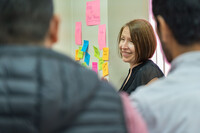What do people value about this career?
In our careers and skills survey, scientists working in business development told us that they appreciate that their work:
- has high task variety
- is intellectually stimulating
Career guidance for early career researchers in the life sciences and related fields
Business development involves developing external relationships that provide valuable information or may lead to future business deals or mutually beneficial partnerships.
The biotechnology and pharma sector, instrumentation and other (life science) companies employ business development professionals as technology scouts, to gain market insights and to build and maintain relationships with key opinion leaders, decision-makers and potential future cooperation partners. These roles focus on information exchange and long-term partnerships, rather than generating immediate revenue through selling products. For example, big pharma employs business development professionals to develop new relationships with potential R&D partners at other companies and the academia sector, and to maintain ongoing partnerships.
In the academic setting, business-development-like roles also exist under a variety of job titles like “Industry Relations” or “Industry Liaison” – particularly within the technology transfer offices of universities and research institutes.
In some roles, for example in ‘contract research companies’, business developers are focused on advising both current and potential clients on the choice and set-up possibilities for complex scientific services offered by the company; these roles have some overlap with technical sales positions.
The job titles and the tasks associated with business development positions vary greatly. Possible tasks may include a subset of the following activities:
Some junior business development roles in start-ups or tech transfer offices can be accessed directly from the PhD or postdoc. For roles in larger companies, it may be difficult to enter directly into a business development role without previous industry experience – in our experience, it seems that PhD-holders in these roles have often (but not always) acquired experience in another industry role first (e.g. sales, R&D, project management, management consulting).
Example job titles:
Business development professionals need to be able to quickly build effective relationships with people, requiring good people and communication skills. An ability to understand the technology/science relevant to the role is important, as well as being able to extrapolate from that and clearly see which opportunities may be of interest to the company. Finally, organization is key to keep track of all the different connections (both people and information).
In our careers and skills survey, 6 business development professionals told us about the competencies they used most often. The most commonly selected competencies were:

In our careers and skills survey, scientists working in business development told us that they appreciate that their work:
We highly recommend learning more about the careers using the resources above, then conducting informational interviews to gain further insights directly from former PhDs working in career areas that interest you.
Further internal resources (e.g. library of recorded career talks) can be found on our intranet pages.
In this blog post, Erminia Rubino shares how she made the transition from a PhD in the life sciences to a career in innovation and technology.
For this profile, we talked with Kinga Bercsenyi, Associate Director Business Development Translational Oncology Solutions at Champions Oncology. Kinga told us about her current role and how informational interviews were key for her transition from a postdoc to her first business development role.